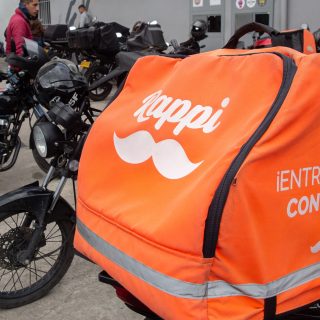On January 1, Breno de Souza, a Rappi delivery worker in São Paulo, was met with an unpleasant surprise when he logged on to the app to start his first shift of the year: an unexplained debt of 12 reais ($2.40) on his account. He then found out that it was Rappi’s new service fee for workers.
“I was working in December normally and this didn’t exist,” de Souza told Rest of World. “When we came back to work in January, they were charging us.” The charge, which now appears on his account every Monday, is automatically deducted from his earnings.
Rappi, Colombia’s last-mile delivery unicorn, has begun imposing a fee on its drivers in Brazil, effectively forcing them to begin each week in debt to the platform. The move comes on the heels of what Fairwork, a unit of the Oxford Internet Institute dedicated to studying gig work, calls a “paradigmatic shift in platform operating models from the investor-oriented fundraising strategy … to a more traditional profit-loss strategy.”
Rappi’s move to institute the fee comes nearly a year after the company reached its financial break-even point. It could help Rappi earn additional revenue from its workforce, which experts and workers say is abusive.
“Food and goods delivery digital platform work is already some of the most precarious, underpaid employment in Brazil,” Gonzalo Martinez de Vedia, Brazil program director at labor rights organization Solidarity Center, told Rest of World. “Any new fee that subtracts from wages in that equation throws the sector further into substandard conditions.”
Rest of World spoke with 12 delivery workers who said Rappi had not informed them of the new tariff, and that they learned about it only after discovering the debt assigned to their accounts. In an undated press release, Rappi said the fee was a result of its merger with BoxDelivery, a Brazilian delivery company it had acquired in June 2023. The weekly charge is a “use and licensing fee” for the two platforms, according to the statement.
Rappi declined an interview request from Rest of World.
Earlier this month, a group of workers in Rio de Janeiro, Brazil’s second-largest city, staged a demonstration against the weekly charge and organized a strike, forcing a Rappi dark store and a supermarket to temporarily shut doors. The day after the mobilization, Rappi representatives met with several workers, including Jefferson Antero.
“I told them that either they take the 12 reais charge out or increase the rate,” Antero, a delivery rider for Rappi, told Rest of World, “but my voice made no difference.”

The merger with BoxDelivery — and the subsequent fee — comes with a series of “benefits” for workers, the company’s statement said: an increase in the minimum pay for each delivery made via motorcycle or car to $1.40, a 30-cent bonus for rainy weather, weekly opportunities to earn extra money, and a larger client base.
But some drivers told Rest of World they are yet to see these benefits. Isaias Rodrigues, a delivery rider in São Paulo who uses a bike, said Rappi’s recent promotions are not as attractive for workers and the rates for bike deliveries remain the same.
“When workers’ debt outpaces wages, a form of coerced labor called debt bondage can happen,” said Martinez de Vedia. For him, the new charge worsens the already elevated risk of “debt spirals” for workers in the sector.
Rappi workers told Rest of World this might prompt some of them to jump ship and work exclusively for iFood, the Brazilian platform that controls 80% of the country’s food delivery sector. Some, like Antero, said iFood offers better working conditions than Rappi, including a higher bonus for inclement weather.
Johnny Borges, director of social impact at iFood, told Rest of World the company has no plans to introduce a similar fee. “For us, delivery drivers are platform workers, and as workers, nobody pays to work,” he said.
If gig workers leave Rappi to work only with iFood, the latter’s near-monopoly in Brazil would be consolidated, which could lead to increasingly precarious conditions for workers in the long run. “The lack of competition means that there are few checks to stop working conditions from deteriorating and shows the desperate need for regulations to stop this,” Anjali Krishan, a postdoctoral researcher at Fairwork, told Rest of World.
“I’m still keeping both as a test, but very soon I’ll abandon Rappi to focus on iFood.”
In a 2023 report she coauthored, Krishna argued that the year was marked by a “tightening of pay and conditions as companies either try to become profitable, or try to demonstrate the possibility of profitability in an effort to attract further capital investment in challenging international financial markets.”
Antero said several of his colleagues have already canceled their Rappi accounts. “I’m still keeping both as a test, but very soon I’ll abandon Rappi to focus on iFood,” he said.
For many workers, depending on a single platform is not viable. If one delivery app is having a slow day, they can still make money by taking orders through a second one.
Felipe Araujo, a bike-delivery rider in São Paulo, told Rest of World he considers Rappi’s new charge unfair, but that he will continue working with the app. It’s the only way he can save enough money to buy a motorcycle, find a permanent job, and leave the apps — for good.
“I just can’t understand it,” said Araujo. “[Rappi] already makes so much money charging customers for the delivery fee and now they want to make money off of the workers as well.”
Source: restofworld.org



